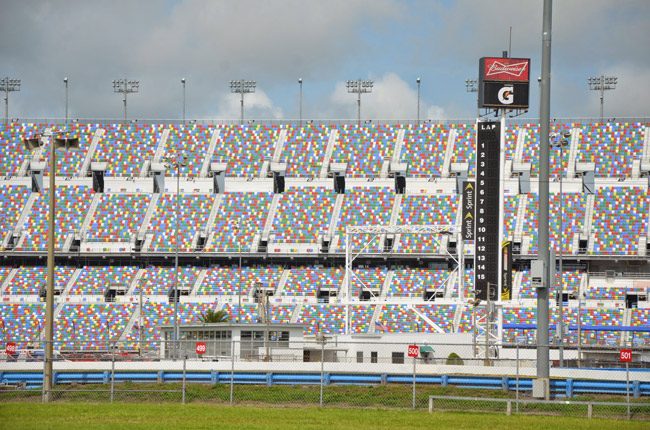
Sports franchises wouldn’t be able to build or renovate stadiums on publicly owned land under a measure that won House approval Thursday.
But while the House voted 82-33 to support the bill (HB 77), the Senate hasn’t been in the same ballpark on the issue.
“It’s fine here, but the Senate … a lot of things are not moving over there, so we’ll see how everything shakes out,” said House bill sponsor Bryan Avila, R-Hialeah.
The bill is part of an effort by House leaders to limit public assistance to private companies, reflecting a broader philosophical gulf from the Senate on business incentives, tourism marketing and government funding of professional sports facilities.
A similar Senate proposal (SB 122) not been heard in committees, nor has another bill (SB 236) that would seek to repeal a 2014 law that potentially made available $13 million a year for stadium work.
“A sports franchise, or a team, is a business. You will be hard-pressed to find many cases where the local government has provided publicly owned land to other businesses,” Avila said Thursday on the House floor. “When we talk about economic development, and some people have mentioned this, do they provide as much economic development as let’s say a UPS, a Subway, Domino’s Pizza, McDonald’s, some of these other businesses that are on every corner in the community? How many employees do they employ? How much economic activity do they generate? We do not give them publicly owned land.”
The House during the past few years has virtually ignored the 2014 stadium-funding law, despite the Florida Department of Economic Opportunity saying that applications for EverBank Field in Jacksonville, Sun Life Stadium in Miami-Dade County, Daytona International Speedway, Raymond James Stadium in Tampa and a soccer stadium in Orlando had satisfied state requirements.
The state agency received just a single application, for Raymond James Stadium, for the current year.
Rep. Richard Stark, D-Weston, objected to Avila’s bill Thursday, saying it would prevent local governments from deciding what projects they consider right for their communities.
“Taking this away from local communities is just another chipping away that we’ve had continually against home rule,” Stark said.
The Tampa Bay Buccaneers, Miami Heat, Orlando Magic, Tampa Bay Lightning, Florida Panthers, Miami Marlins, Jacksonville Jaguars and Tampa Bay Rays play in stadiums on publicly owned land. Also publicly owned land is used for all but one of the state’s Major League Baseball spring-training facilities.
Opposition to stadium funding has grown since a 2009 deal by Miami-Dade County to borrow about $400 million through bonds for Marlins Stadium that, according to projections, may come to a cost of more than $2.4 billion when the final payment is due in 2048.
But Rep. Wengay Newton, D-St. Petersburg, said Avila’s bill, combined with a House plan to eliminate economic-development incentives (HB 7005), “handcuffs the entire state.”
“If you take the land away, which is probably all some of these local governments have … you can forget about growing the state, growing the tax base, creating jobs,” said Newton, whose district includes stadiums.
Rep. Kathleen Peters, R-Treasure Island, said the proposal could hurt future efforts to emulate plans by Tampa Bay Rowdies owner Bill Edwards, who intends to spend $80 million of his own money to renovate Al Lang Stadium in St. Petersburg from a baseball field into a Major League Soccer-ready facility.
“Why are we shutting down public-private partnerships?” Peters asked. “Why should this gentleman not have the ability to invest $80 million, no taxpayers’ money whatsoever, $80 million to keep this historic integrity and make it a viable stadium, and we then get to benefit from the economic stimulation that comes from that?”
–Jim Turner, News Service of Florida






























Knightwatch says
Oh, no! I find myself agreeing with Florida’s alt-right Republican House… in principle. I don’t much like giving away public land for promises. I think sports teams in particular, and business entrepreneurs in general, have a track record of promising us this and giving us that. I understand the “local sovereignty” issue, but maybe there’s an answer in between state regulation and local control that protects the public from over-enthusiastic politicians and chambers of commerce.
taxes says
I’d like to see how much property tax dollars the France family has paid on this facility. I’ve had very reputable source tell me it’s very, very, very, very low. It’s probably on public record, I just never bothered to try and find it. I agree business brings tourism, but we are doing it at the expense of the local people, with one family reaping in all of the benefits.
Donnie Riddle says
They made a fortune on the backs of the race fans forever! It Dale Earnhardt losing his life before they spent the money on safe walls. Wouldn’t be one there yet if it had been a lesser driver. Besides that they tried to make Bill Simpson out to be the scapegoat! Just like the 1979 500 was started with the track still damp so they didn’t lose tv money from cbs.
cls says
All those conspiring against local government’s home rule should be kicked out of office asap, or recalled.
truth says
How can we accuse the France family of not suppor,ting the community when they jobs they create are literally the backbone of the Volusia economy? SMART government leads to stimulus and job growth corporate welfare leads to excess and GDP decline Private-Public partnerships assume an inherent risk upon the private entity- incentivizing them to grow and succeed. Private-Private partnership leads to private wealth accumulation outside of the economic markets which is NOT good for local economies when the entities aremultinational and out of town foreigners. It is not healthy to create predatory markets, because those markets tend to COLLAPSE flagler county
JT says
Truth, I wish it were different but we already have predatory businesses’ in Flagler County….especially in the Hammock.
Connect the dots, they have duped many ….